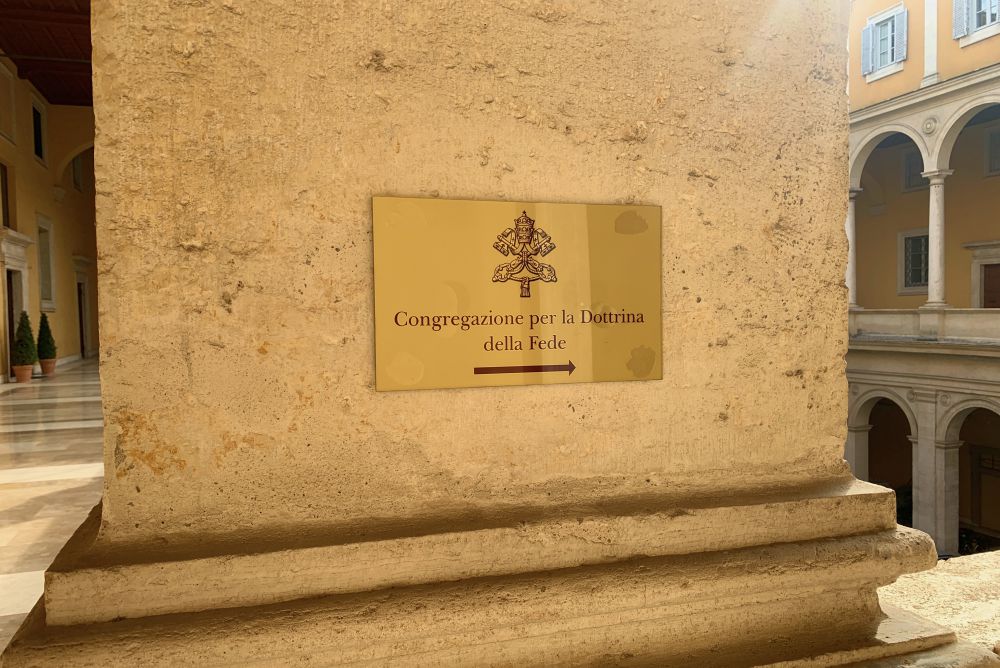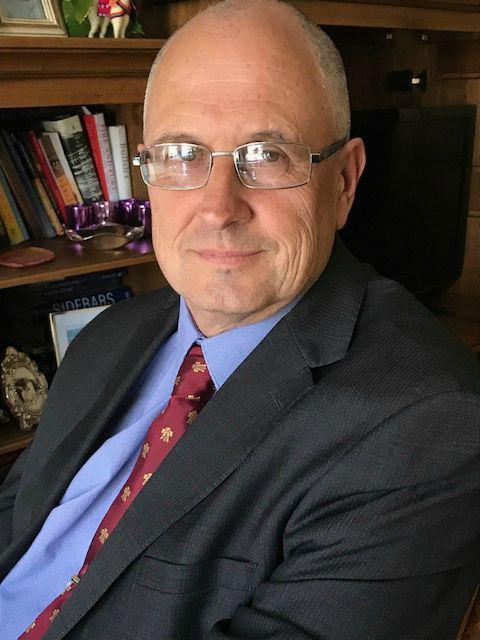
A sign inside the Vatican's Palace of the Holy Office giving direction towards the offices of the Congregation for the Doctrine of the Faith, pictured in February 2019 (NCR photo/Joshua J. McElwee)
I am pleased to announce that Peter Feuerherd, who has reported widely on parish and accountability issues as an NCR contributor, will be joining the staff full-time as news editor.
Feuerherd, 62, a veteran of Catholic journalism, will oversee day-to-day news coverage, working with members of the NCR staff and freelancers. He brings to his new role proven skills as a journalist and editor, as well as a deep understanding of the church, both as an observer and someone who has worked within the institution.
In his work on the Field Hospital feature for NCR since October 2015, he has reported on parishes across the U.S., identifying trends and seeking out examples that match up with Pope Francis' vision of parish life dedicated to healing the wounded. Feuerherd paid particular attention to parish outreach to Latinos and the LGBTQ communities as well as the ongoing Vatican II/traditionalist tensions in parish life.
"I have been a regular NCR reader since my college days," said Feuerherd, commenting on his new role. "As I watched my late brother Joe's work with the website and print paper, NCR in many ways became a part of my family, a kind of intrepid cousin who did really interesting stuff that I heard about regularly. Reporting and commentary on Catholic issues with an independent, critical voice is now more important than ever. I look forward to contributing to that vision."
Peter's brother, Joe Feuerherd, who died of cancer in 2011 at age 48, had a long history with NCR. He started as a student intern, spent two stints as head of NCR's Washington bureau and served as publisher from 2008 to 2011.

Peter Feuerherd
Peter Feuerherd graduated from St. John's University in New York with a degree in theology and history and earned a master's degree in political communication from State University of New York at Albany. In 2003, he received a Medill School of Journalism Fellowship for religion, spirituality and ethics reporting.
His career as a writer includes being national affairs writer for National Catholic Register from 1991 to 1997; news editor and assistant editor for The Long Island Catholic, 1991 to 1998; and current work for NCR. He is the author of Holy Land USA (Crossroad Publishing), a look at the growing interaction between Catholics and evangelicals, and the upcoming biography, The Radical Gospel of Bishop Thomas Gumbleton, which is being published by Orbis Books and is due out in the fall.
He also served as director of communications for the Catholic Diocese of Camden, New Jersey. He currently teaches a journalism course at St. John's University.
His work has appeared in a broad range of publications, including New York Newsday, Religion News Service, Catholic News Service, Commonweal, German Catholic News Agency, The Tablet of London, US Catholic and the Scribner Encyclopedia of American Lives.
He and his wife, Mercedes, live in New York. He is the father of two children and a stepson, and has two grandchildren.
______
I recently did a quick look through NCR's electronic data base to try to determine the first time the term "clerical culture" was used in connection with the priest sex abuse crisis. No surprise that it brought up a piece by Eugene Cullen Kennedy published March 19, 1993, just eight years after the first major revelation of the crisis.
It is a long essay headlined, "The see-no-problem, hear-no-problem, speak-no-problem problem." The subhead was "Sex abuse and Catholic clerical culture." He wrote, "This is a problem not of the priesthood itself but of the clerical culture in which it is set. Nobody questions the centrality of the sacramental priesthood in Catholic life. Many believers soon will, however, unless the blight that seems to grow out of, and at the same time devour, clerical culture is honestly identified and dealt with in a serious manner."
It has taken decades to reach the point of honestly identifying and dealing with the considerable downsides of clerical culture. We are running two articles, culled from a longer piece Kennedy was working on when he died in 2015, on the website this week. We received the manuscript from his widow, Sara Charles Kennedy, who also gave us permission to publish them.
I've spent considerable time in this space recently discussing the view of Jesuit theologian Fr. James Keenan regarding how the hierarchical culture, which is part of the clerical culture, played a distinctive role in the cover-up of the abuse crisis. I hope to continue in future columns the discussion and to recount some of the insightful reactions from others, including priests, to Keenan's work.
For the moment, however, it is enough to acknowledge that Kennedy long ago deeply understood the origins of the scandal and where it was headed. He was one of the insightful and courageous voices that most bishops chose to ignore and even disparage. One hopes that, given the relentless shame they've had to endure, the bishops may now be ready to benefit from his wisdom.
______
If Kennedy provided a certain unalloyed honesty for a past era in the church, Massimo Faggioli, who teaches theology and religious studies at Villanova University, has become one of the distinctive voices for truth in the church in this era. He will be delivering a talk, "Institutional Church and Academic Theology in a Time of Catholic Disruption," Friday during a panel at the annual meeting of the Catholic Theological Society of America. It is a piece that raises compelling questions about the relationship of the academy to the institutional church. We will be publishing the text of the talk Friday evening, following its delivery at the conference.
______
Advertisement
You might also want to check out the website today for two articles. Vatican correspondent Joshua J. McElwee obtained a draft of Pope' Francis' proposed new apostolic constitution, Praedicate Evangelium, which contains plans for reorganizing the Vatican's sprawling bureaucracy.
His report on the document is accompanied by a separate analysis piece by Richard Gaillardetz, a noted ecclesiologist who reviewed the draft and provides a commentary on the text.
______
Back in February, I called attention in this space to a two-part report on "Nuns and Nones" by Global Sisters Report's Soli Salgado.
"This is a tale, wonderfully reported," I wrote at the time, "about the most unlikely meeting of needs and fulfillment, curiosity and attainment, of young lives searching for something more than the fidgety nature of contemporary culture, and lives grounded in traditions whose roots reach deep into the history of Christian spirituality." Some of you probably saw that The New York Times recently caught up with the story, reporting on the end of one portion of the initiative, under the headline, "These Millennials Got New Roommates. They're Nuns." Salgado's report on the same initiative will appear next week at Global Sisters Report.
In the Times story, the writer acknowledged Salgado's work and asked her for comment:
"Soli Salgado, a reporter for Global Sisters Report who has been tracking the Nuns and Nones movement, said she thinks this is the sisters' most existential worry.
" 'When they talk about dying out, they're less concerned about making sure the institution survives and more about who's going to inherit the charism, who's going to keep doing this mission that's been fueling them all these centuries,' Ms. Salgado said. 'For the sisters, Nones and Nuns could be a vehicle for passing along their charism.' "
Global Sisters Report and Salgado have been tracking the story for months — and they'll keep tracking it. Stay tuned.
[Tom Roberts is executive editor of National Catholic Reporter. His email is troberts@ncronline.org.]






